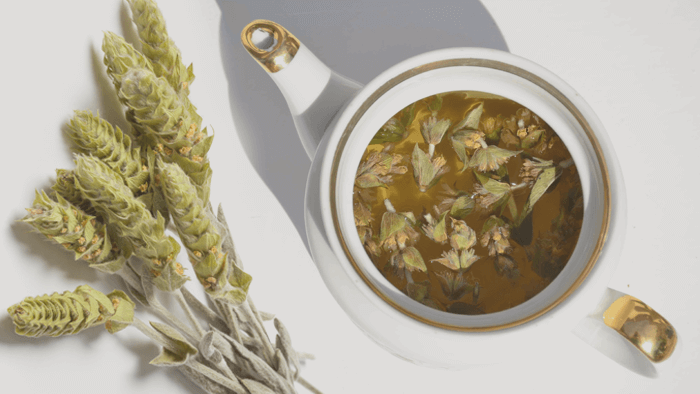
14 Jan The Benefits to Greek Mountain Tea
One of the most famous and widely consumed herbal teas in Greece is Greek Mountain Tea, locally known as Tsai Tou VouNou meaning ‘tea of the mountain’. It is also known as Shepherd’s Tea as Greek shepherds would brew it while tending to their flocks high up in the mountains. Made from leaves of freshly harvested Sideritis species, Greek Mountain tea has been drunk for millennia and is touted for its numerous health benefits.
Mountain tea generally thrives in rocky places at an altitude of 1000 metres and above. The plant has been scientifically shown to offer a multitude of important health benefits as it has powerful antioxidant qualities previously recognised only in green tea. But that’s certainly not all—this herb is also shown to have potent antiviral, antimicrobial, anti-fungal and antioxidant qualities. It is said to boost the immune system; whilst drinking two to three cups of mountain tea every day is thought to help prevent or fight flu symptoms and stress-related ailments such as chest infections, a foggy head, digestive complaints, fatigue and anxiety.
Hippocrates, the great philosopher and father of modern medicine, praised Greek mountain tea for its positive effect on the immune and respiratory systems. And for thousands of years, Greeks have been drinking this tea for its abundance of health benefits such as a positive effect on colds, respiratory problems, digestion, the immune system and anxiety. More recently, modern science has begun to delve into better understanding the health benefits of Greek mountain tea. And some of the resulting studies indicate that it may have promise in the prevention of osteoporosis, Alzheimer’s and even cancer.
The health benefits of Greek mountain tea are attributable to its rich phyto-nutrient content. Phyto-nutrients are organic compounds found in plants, which protect them from things like pests, ultra-violet rays and disease. And phyto-nutrients are believed to play a significant role in optimising our health, and protecting us from age related disease. That is one of the reasons it is important to include a broad variety of plants in our diet. Certain herbal teas, like Greek mountain tea, can provide a boost to our daily intake of phyto-nutrients. Greek mountain tea is a potent source of two important classes of phyto-nutrients—polyphenols and flavonoids, both of which contain significant antioxidants. Other important phyto-nutrients found in Greek mountain tea include caffeic acid (not to be confused with caffeine), luteolin, quercitin and apignen.
And we’ve decided to list you some interesting benefits to our now favourite tea!
Full of Flavonoids and Antioxidants
In 2011, the Journal of Ethnopharmacology published a study on the flavonoid content of all plants found within the Sideritis genus. Despite the wide array of species available— over 150—researchers found that all Sideritis species plants were shown to contain anti-microbial, anti-inflammatory, antioxidant and anti-spasmodic properties. They were rich in a number of natural antioxidants, including flavonoids, and almost all species also contained essential oils.
Lowers Blood Pressure
A 2012 publication of the Journal of Physiology and Pharmacology found that extracts made from Sideritis helped lower blood pressure levels while helping blood vessels to relax. The animal study measured arterial blood pressure and found that a dose of Sideritis extract led to blood vessel dilation, which helped lower blood pressure levels and reduced stress on the heart muscle. While the studies helped support the use of Sideritis for its heart health benefits, further research is needed before Greek mountain tea can be considered a treatment for cardiovascular conditions.
Protects the Digestive System
In 2012, Planta Medica published an animal study on the effects of Greek mountain tea on gastrointestinal health and disorders. Researchers found that taking an oral dose of Greek mountain tea led to less inflammation in the gastrointestinal tract, likely due to the presence of phenols and antioxidants found naturally in the plant. Researchers also found that taking the supplement led to reduced inflammation and toxicity in the long term, demonstrating Greek mountain tea’s protective abilities. While the results were promising, further study is needed on Greek mountain tea as an herbal treatment for gastrointestinal complications.
Brewing Greek Mountain Tea
Greek mountain tea is brewed using all parts of the herb (flowers, leaves and stems), however, the Sideritis herb does not give up its many benefits easily. It must be briefly boiled as part of the steeping process in order to extract the full flavour and benefits. It is only fitting that such an ancient beverage would be prepared the same way today as it was thousands of years ago by the likes of Socrates and Hippocrates, as they debated the weightier matters of life on the steps of the Parthenon.
When brewing Greek mountain tea, place around 6-8 pieces of 5 cm the plant into boiling water and lower the heat, allowing it to simmer for 5-10 minutes depending on how strong you like the tea. Greek mountain tea has an earthy taste and, if you use the flowers, a slight floral scent. For dried tea leaves or tea bags, add about 2 tablespoons, or a third of a tea bag into a teapot and fill with boiling water, letting steep for 5-10 minutes. It pairs with honey in a way that no other tea does—a duo seemingly intended by Mother Nature.
And while the Greeks sip their mountain tea primarily as a hot beverage, it also makes an excellent iced tea during these warmer months. Who needs synthetically infused vitamin water when a natural beverage full of antioxidants, phyto-nutrients and history is at hand?
